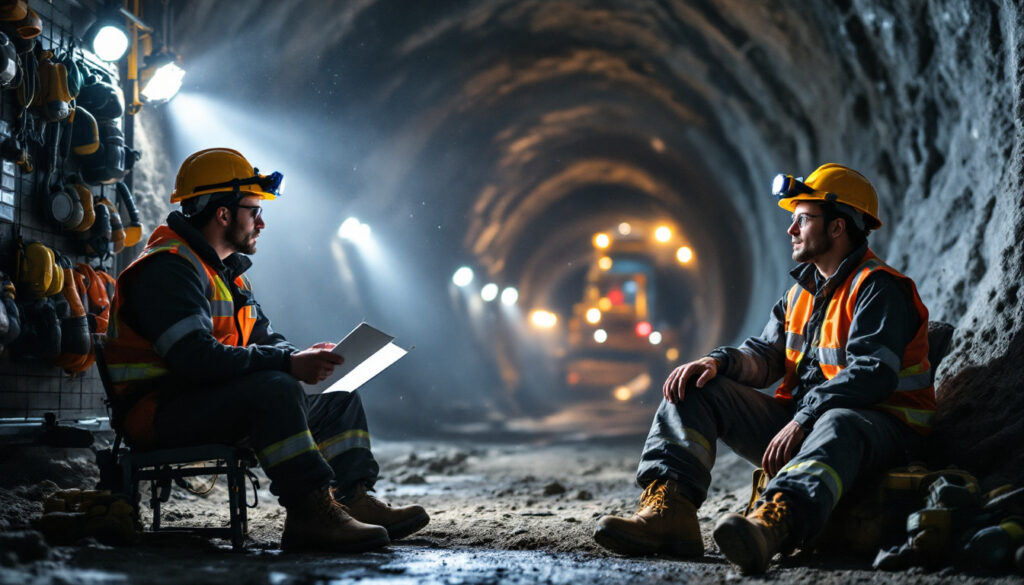What to Expect in a Mining Job Interview
The mining industry values well-prepared candidates who understand both technical requirements and safety protocols. Knowing what questions to expect allows you to demonstrate your knowledge and suitability for the role.
Common Mining Interview Questions
When preparing for a mining job interview, you'll likely face industry-specific questions alongside traditional interview inquiries. One of the most common opening questions is "Tell me about yourself." Rather than sharing your life story, focus on relevant mining experience, technical skills, and perhaps a brief mention of why you're passionate about the industry.
"What do you know about our mining operation?" tests whether you've done your homework. Researching the specific type of mining (open-cut, underground, coal, gold, etc.), the company's history, and their safety record demonstrates genuine interest. According to industry recruiters, candidates who can discuss specific details about the operation are 40% more likely to progress to the next stage.
Safety-related questions form the backbone of mining interviews. When asked "What does safety mean to you?", avoid generic answers. Instead, explain your personal safety philosophy, perhaps mentioning the mining industry's goal of zero harm and how you've contributed to enhancing safety initiatives in previous roles.
The question "Where do you see yourself in 5 years?" helps employers gauge your commitment to mining as a career rather than just seeking a high-paying job. Industry turnover can be costly, with companies spending an average of $45,000 to recruit and train each new employee.
Technical questions like "What is PPE and name three examples?" verify your fundamental knowledge. Personal Protective Equipment includes hard hats, safety boots, high-visibility clothing, gloves, hearing protection, and respiratory equipment.
Safety-Focused Questions
Mining employers place extraordinary emphasis on safety awareness. You may be asked to "Describe a safety hazard you've identified and addressed" to demonstrate your proactive approach to workplace hazards.
Questions about speaking up regarding unsafe practices reveal your willingness to prioritize safety over production pressures. Mining companies know that employees who remain silent about safety concerns can contribute to serious incidents. Statistics show that mines with strong safety reporting cultures experience 37% fewer recordable incidents.
Scenario-based questions like "How would you respond if you witnessed a safety violation?" or "What would you do if equipment malfunctioned during operation?" assess your decision-making under pressure. The Australian mining industry has documented that proper emergency responses can reduce incident severity by up to 60%.
Behavioral and Problem-Solving Questions
Mining interviewers use behavioral questions to predict future performance based on past actions. When asked about mistakes or performance improvement, be honest while emphasizing your learning and growth. Self-awareness ranks among the top five qualities mining supervisors value in team members.
"Tell me about a time you went above and beyond your job requirements" reveals your work ethic and initiative—qualities crucial in remote mining operations where resourcefulness matters. Examples might include volunteering for additional responsibilities or helping troubleshoot equipment issues outside your direct role.
Conflict resolution questions assess your ability to maintain positive relationships despite challenging conditions. Mining teams often work 12-hour shifts in close quarters for extended periods, making interpersonal skills as important as technical abilities.
How to Prepare for a Mining Job Interview
Thorough preparation can significantly improve your chances of securing a mining position, especially in competitive markets where entry-level roles can attract hundreds of applicants.
Essential Pre-Interview Research
Start by researching the specific mining operation. Is it an open-cut gold mine, underground coal operation, or perhaps iron ore? Different minerals require different extraction methods and equipment. Understanding these differences shows genuine interest and industry knowledge.
Review the equipment used at the site by studying company presentations, annual reports, or social media. Being familiar with brands like Caterpillar, Komatsu, or Liebherr and their specific models demonstrates technical awareness that impresses interviewers.
Mining operations typically follow one of several shift patterns: 8/6 (8 days on, 6 off), 2/1 (2 weeks on, 1 week off), or 4/3. Understanding the roster and whether the role involves FIFO (Fly-In, Fly-Out) arrangements helps you determine if the lifestyle suits your circumstances.
Company values and safety culture vary significantly between mining operations. Some emphasize environmental rehabilitation, while others focus on community engagement or digital transformation in mining. Aligning your responses with their priorities creates a stronger connection.
Prepare thoughtful questions about the specific role, typical crew assignments, and potential start dates. According to mining recruitment specialists, candidates who ask insightful questions are perceived as 35% more engaged than those who don't.
Documentation to Have Ready
An updated resume highlighting relevant experience and skills should be your first priority. Mining employers look for specific technical competencies, so customize your resume to emphasize relevant qualifications.
Have reference contact information readily available, as reference checks are standard in the mining industry. Choose references who can speak directly to your work ethic, safety consciousness, and technical abilities.
Prepare notes on key talking points that demonstrate your fit for the role. These might include specific examples of safety initiatives, technical troubleshooting, or team collaboration under challenging conditions.
Create a list of thoughtful questions to ask interviewers. Questions about training opportunities, career progression, and team structure demonstrate long-term thinking that employers value.
Gather all relevant certifications and qualifications, ensuring they're current. Mining roles may require various tickets such as Confined Space, Working at Heights, or vehicle licenses depending on the position.
Technical Preparation
For phone interviews, ensure your device is fully charged and you have a reliable signal. Mining recruiters report that technical difficulties force the rescheduling of approximately 15% of initial interviews, creating delays in the hiring process.
Find a quiet location without distractions, particularly important for video interviews where background noise can create a negative impression. Professional miners recommend using a headset to improve audio quality during remote interviews.
Have a notepad and pen ready to record important information mentioned during the interview. This demonstrates attentiveness and helps you follow up effectively on specific points.
If conducting a video interview, test your connection beforehand and ensure your background appears professional. A neutral background with good lighting creates a positive first impression.
Remove potential interruptions like pets or family members, particularly important when discussing complex technical questions that require your full attention.
Real Mining Interview Experience: A First-Hand Account
Understanding real experiences provides valuable insights into what actually happens during mining job interviews, beyond theoretical advice.
Initial Interview Process
"My interview for an operator position at a gold mine started with a phone screening involving the site supervisor and HR representative," shares James, a haul truck operator with five years of experience. "They alternated asking questions, starting with my background and gradually progressing to more technical content."
Most initial interviews include questions about personal background and interests. While seemingly casual, these questions assess cultural fit for remote mining operations. Interviewers look for candidates who can maintain positive attitudes during extended periods away from home.
Technical questions focus on specific mining operations relevant to the role. For haul truck positions, expect questions about load management and vehicle inspections. Drill operators might discuss pattern spacing and bit selection. These questions evaluate your practical knowledge beyond certifications.
Safety scenario discussions form a critical component of mining interviews. "They described a situation where I noticed a colleague bypassing a safety procedure and asked how I'd respond," explains Sarah, a processing plant operator. "They were looking for specific steps: approach the person directly, explain the concern, offer safer alternatives, and follow up with supervision if needed."
The opportunity to ask questions reveals your priorities and preparation. Questions about training opportunities, shift structures, and advancement pathways demonstrate forward-thinking and commitment to mining as a career rather than just a job.
Unexpected Challenges
Many candidates are caught off-guard by technical terminology questions. "They asked me what PPE stood for and to name specific examples," recalls Michael, now a safety coordinator. "It seems basic, but they want to ensure you understand fundamental safety concepts." Personal Protective Equipment knowledge serves as a quick assessment of safety awareness.
Behavioral scenarios requiring quick thinking often challenge unprepared candidates. Mining interviewers might present complex situations involving equipment failures, weather emergencies, or interpersonal conflicts to evaluate your decision-making process under pressure.
Questions about handling difficult coworkers reveal your conflict resolution skills—critical in mining environments where teams work closely for extended periods. Your approach to maintaining productivity despite interpersonal challenges predicts your effectiveness in isolated mining communities.
The need to demonstrate safety awareness and initiative runs throughout mining interviews. "They asked me to describe a time I identified a potential hazard before it caused problems," shares Emma, a maintenance supervisor. "They wanted specific examples of proactive safety behavior rather than generic statements about following rules."
Post-Interview Steps
Reference checks for shortlisted candidates are extraordinarily thorough in mining. Unlike some industries where references receive cursory calls, mining employers typically conduct detailed conversations about your work habits, safety consciousness, and technical abilities.
Medical assessments include physical capability tests specific to mining requirements. These might involve lifting, climbing, squatting, and other movements common in mining roles. Approximately 12% of conditionally approved candidates don't pass these assessments, according to industry statistics.
The complete process from interview to job offer typically takes 2-3 weeks, longer than many other industries due to comprehensive background checks and medical clearances. This timeline can extend further for specialized roles requiring verified qualifications.
Successful candidates must complete site-specific inductions and training before beginning work. These inductions cover emergency procedures, environmental protocols, and equipment familiarization, often lasting several days depending on the complexity of the operation.
How to Stand Out in a Mining Job Interview
With competitive salaries and benefits attracting many applicants, distinguishing yourself requires specific strategies aligned with mining industry priorities.
Demonstrating Safety Awareness
"When I interview candidates, I look for specific examples of identifying and addressing hazards," explains Robert, a mining recruitment specialist. "Anyone can say safety is important, but I want to hear about times they actually took action." Prepare detailed safety stories from previous roles, even if they're from non-mining environments.
Discussing your understanding of risk assessment demonstrates sophisticated safety thinking. Explain how you evaluate likelihood and consequence when confronting potential hazards, and describe your familiarity with hierarchy of controls (elimination, substitution, engineering controls, administrative controls, PPE).
Emphasize your commitment to following procedures, particularly important in mining where standardized processes prevent injuries. Approximately 65% of mining incidents involve procedural deviations, making strict adherence a critical quality in new hires.
Show willingness to speak up about unsafe conditions, often the last defense against serious incidents. "I value candidates who can describe a time they stopped work due to safety concerns," says Patricia, a site supervisor. "It shows they prioritize wellbeing over production pressure."
Highlighting Relevant Skills
Mechanical aptitude and equipment operation experience transfer well between industries. Even if you haven't worked specifically in mining, emphasize relevant technical skills from construction, manufacturing, or agriculture that demonstrate your ability to work with heavy machinery.
Problem-solving abilities under pressure distinguish exceptional mining candidates. "I ask people about breakdown scenarios and how they've handled them," notes Daniel, a maintenance manager. "Those who can clearly explain their troubleshooting process while maintaining composure typically succeed in our environment."
Team collaboration and communication skills prove essential in mining operations where crew members depend on each other for safety and efficiency. Specific examples of successful teamwork in challenging conditions demonstrate your ability to integrate into tight-knit mining crews.
Adaptability to changing conditions and requirements remains particularly valuable in mining, where weather, ground conditions, and equipment availability constantly shift. Candidates who demonstrate flexibility and resilience typically adapt better to mining's dynamic environment.
Asking Thoughtful Questions
Inquiring about crew assignments and team structure shows you understand mining's collaborative nature. Questions like "How many operators typically work each shift?" or "What's the experience level of the maintenance team?" demonstrate awareness of mining's team-based operations.
Ask about advancement opportunities and skill development to signal long-term commitment. Mining operations prefer to promote internally, with approximately 70% of supervisory roles filled through internal advancement according to industry surveys.
Questions about typical day-to-day responsibilities reveal practical thinking. "Tell me about a typical shift for this position" helps you understand shift handovers, pre-start meetings, and equipment inspection requirements—routines that form the foundation of mining work.
Discussing camp facilities and accommodation arrangements shows you've considered the lifestyle implications of mining work. Questions about internet connectivity, fitness facilities, and meal provisions demonstrate realistic expectations about FIFO or remote site living.
FAQ About Mining Job Interviews
What qualifications do I need for entry-level mining positions?
Most entry-level positions require basic safety awareness, physical fitness, and willingness to learn. The mining industry faces a projected workforce shortage of 86,000 positions by 2030, creating opportunities for new entrants without extensive experience.
Specific certifications vary by role but commonly include working at heights training (for approximately 40% of mining positions), confined space certification (required for about 35% of roles), and heavy vehicle licenses for equipment operators. Some sites accept candidates without these certifications if they demonstrate exceptional aptitude and commit to completing training after hiring.
Previous industrial or mechanical experience provides a significant advantage but isn't always required. According to mining recruiters, candidates from construction, manufacturing, and agricultural backgrounds often transition successfully to mining roles due to transferable technical skills and safety awareness.
How should I prepare for a mining pre-employment medical?
Improve physical fitness, particularly core strength and flexibility, as mining roles typically involve lengthy periods of sitting (equipment operation) interspersed with physical tasks. Industry medical providers report that about 25% of candidates struggle with the functional assessments due to poor core strength.
Practice functional movements like squatting and reaching to prepare for the physical capability assessment. These movements simulate common mining tasks such as entering and exiting equipment, checking underneath vehicles, and accessing maintenance points.
Ensure you can touch your toes and perform basic range-of-motion tests, as these simple exercises often form part of pre-employment assessments. Limited flexibility can trigger further medical evaluation that delays employment.
Maintain a healthy lifestyle leading up to the assessment, particularly regarding hydration and sleep. Medical examiners look for indicators of general health that predict ability to work in challenging mining environments where heat stress and fatigue present ongoing risks.
What should I wear to a mining job interview?
Business casual attire suits office-based interviews for mining positions, typically including clean, pressed pants and a collared shirt for men, or equivalent professional attire for women. Mining employers value neat appearance over formal business wear.
Clean work clothes or neat casual attire works well for site-based assessments, demonstrating practical understanding of mining environments. "When candidates arrive in suits for site interviews, it signals they may not understand the realities of mining work," explains Jennifer, a human resources manager at a coal operation.
Closed-toe shoes are always appropriate and often required for site visits that might occur during later interview stages. Safety boots are recommended if you already own them, particularly for production or maintenance roles.
Minimal jewelry and conservative appearance align with mining site safety requirements, where loose jewelry presents entanglement hazards. Demonstrating awareness of these safety considerations during interviews creates a positive impression.
How important are references in mining job applications?
References are critically important and thoroughly checked in mining recruitment. Approximately 15% of conditional job offers are withdrawn after reference checks reveal undisclosed performance issues, according to industry statistics.
Choose references who can speak specifically to your work ethic, reliability, and safety consciousness—the three qualities mining employers consistently prioritize. Supervisors who directly observed your daily performance provide more credible references than colleagues or character references.
Alert your references that they may be contacted, providing them with the job description so they can emphasize relevant skills and experiences. Mining reference checks typically last 15-20 minutes, substantially longer than in many other industries.
Industry references carry significant weight in hiring decisions, particularly from recognized mining operations. "A positive reference from someone within the same mining company or a competitor carries approximately twice the weight of references from unrelated industries," notes Michael, a recruitment specialist with 12 years of mining experience.
Mining Interview Success Tips
Do's and Don'ts
DO research the specific mine and operation before interviewing. Understanding whether you're applying to a coal mine, gold operation, or iron ore site demonstrates genuine interest. Each mineral requires different extraction methods and equipment, and showcasing this knowledge creates a strong first impression.
DO prepare examples of safety awareness and problem-solving from previous work experiences. "I always ask candidates to describe a time they identified a potential hazard and took action," explains Sarah, a safety supervisor. "Those who provide specific, detailed examples typically have the safety mindset we need."
DO have questions ready to ask the interviewer about operational details, career development, and team structure. Mining professionals report that approximately 80% of successful candidates ask thoughtful questions that demonstrate long-term thinking.
DON'T exaggerate your experience or qualifications, as mining operations thoroughly verify credentials. In a recent industry survey, 23% of mining employers reported withdrawing job offers after discovering qualification discrepancies during background checks.
DON'T speak negatively about previous employers, as mining communities remain surprisingly interconnected. "The mining industry is smaller than most people realize," warns James, a site manager. "Negative comments about previous employers can circulate quickly, potentially affecting future opportunities."
DON'T forget to follow up after the interview with a brief email thanking interviewers for their time and reiterating your interest. While only 35% of mining candidates send follow-up messages, those who do are 30% more likely to receive positive consideration, according to recruitment data.
For more insights on mining careers and interviews, check out the popular Beers with a Miner podcast where industry professionals share their experiences and advice.
Mental Preparation Strategies
Practice answering common questions out loud before your interview, focusing particularly on safety scenarios and technical challenges. This verbal rehearsal improves response clarity and reduces interview anxiety.
Prepare specific examples from your work history using the STAR method (Situation, Task, Action, Result). Mining interviewers value detailed accounts that demonstrate practical problem-solving rather than
Want to Stay Ahead of Potential Mining Career Opportunities?
Discover new mining investment prospects before they hit mainstream attention with Discovery Alert's proprietary Discovery IQ model, which instantly alerts investors to significant mineral discoveries on the ASX. Explore our dedicated discoveries page to understand how major mineral discoveries can lead to exceptional investment returns and career opportunities.




